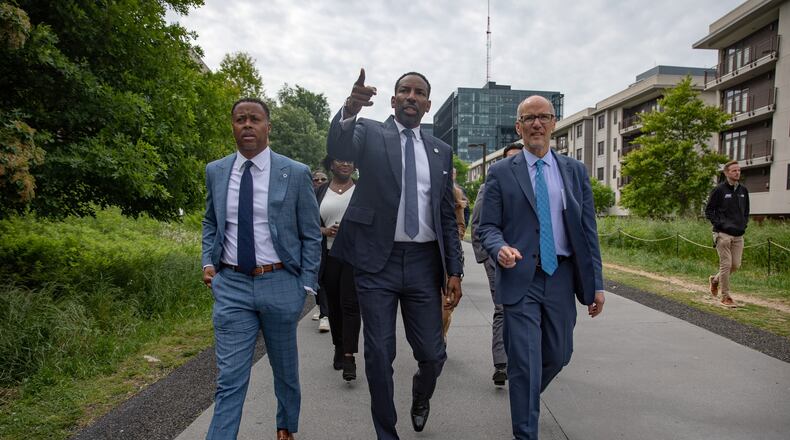The longtime plan to build a light rail system along the city’s 22-mile Beltline is still being debated at both Atlantan’s dinner tables and inside City Hall meeting rooms. And with Mayor Andre Dickens tiptoing around his decision on whether or not to move forward with the endeavor, the future of transit along the trail is unclear.
Dickens has stood steadfast in support for installing mass transit along the popular pedestrian corridor, but questions in feasibility of light rail. The first-term mayor recently went on WABE’s “Closer Look” with host Rose Scott to talk about affordable housing.
During the conversation, Dickens doubled-down on Beltline transit support but also said he’s skeptical of cost estimates for a light rail system to circle the whole path.
“Am I in favor? Yes. Am I committed to pushing it? Yes. But am I sober and fiscally responsible, and somebody who takes every job, every decision I make, very seriously?” he said. “I’ve got to live with the situation of yes, go for it — and we can’t pay for it. Yes, go for it — we can’t operate it.”
“Yes, go for it, and it’s going to cost millions or billions to small businesses while it’s under construction,” he said.
The mayor said the city has hired outside consultants to give detailed cost breakdowns for different transit options like light rail, bus rapid transit and driverless “pods.” That will include an estimate of the cost for riders, he said, adding that Atlantan’s won’t pay to ride if the cost is too high.
“We are still in the state that does not fund its public transit,” Dickens said. “We have New York hopes of transit, but New York state supports the New York Transit System.
“We do not have support for MARTA nor will we have support for the Beltline, as it currently stands — so it’s all in the fare box,” he said.
Plans to move forward with four new MARTA stations at Murphy Crossing, Krog Street/Hulsey Yard, Joseph E. Boone and Armour Yards are still underway. The locations mark the first time the transit system will be directly connected to the Beltline.
---
Credit: Riley Bunch/riley.bunch@ajc.com
Credit: Riley Bunch/riley.bunch@ajc.com
The Dickens’ administration also announced two significant infrastructure investments last week: more money for the Chattahoochee Water Treatment Plant and Fairburn Road.
Legislation introduced through City Council dedicated more than $13.7 million toward improvements to the water treatment plant. The dollars will go toward replacing pumps, restoring pump capacity, upgrading current equipment and making improvements to energy efficiency, according to the city.
Another $33.2 million will go toward the Fairburn Road Complete Street project that spans from Fairburn Road to Martin Luther King, Jr. Drive. The stretch of roadway is set for some significant upgrades including resurfacing, new pedestrian pathways, bicycle lanes as well as drainage improvements.
The state of the city’s infrastructure is top-of-mind after the city’s recent water crisis left residents without clean drinking water for six days and flash floods still plague parts of the city.
---
Credit: Bob Andres, bandres@ajc.com
Credit: Bob Andres, bandres@ajc.com
Trash pickup for Atlantans is about to get a little more expensive. City Council approved legislation on Monday that increases the city’s solid waste collection and recycling fees. Under the legislation, rates will increase 3.5% in Fiscal Year 2025 — beginning on July 1 — with a 2% increase following in 2026 and 2027.
The fee increases were based on a review of the solid waste revenues and costs by the Department of Public Works which determined that they are necessary as the city continues to grow.
---
Got tips, tricks or just want to say hello? Email me at riley.bunch@ajc.com.
Credit: Miguel Martinez
Credit: Miguel Martinez
About the Author
Keep Reading
The Latest
Featured






